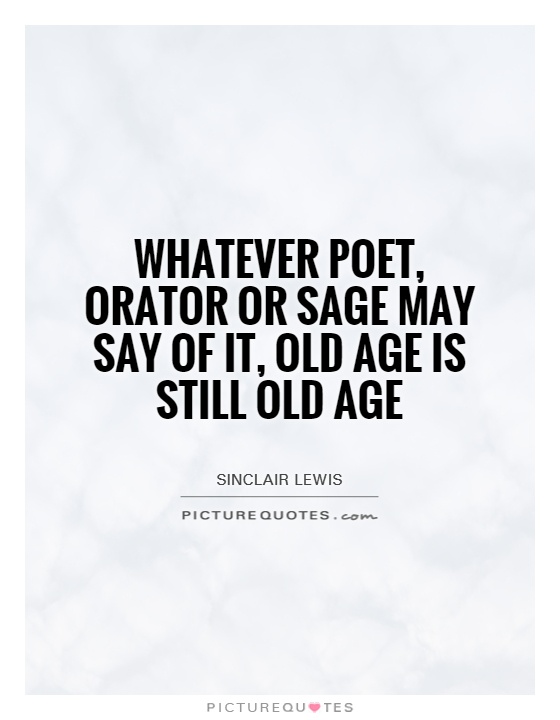Whatever poet, orator or sage may say of it, old age is still old age

Whatever poet, orator or sage may say of it, old age is still old age
Sinclair Lewis, the renowned American novelist and social critic, often explored the complexities of human nature and society in his works. In his novel "Main Street," Lewis delves into the theme of old age and the challenges that come with it. The quote "Whatever poet, orator or sage may say of it, old age is still old age" resonates deeply in the context of Sinclair Lewis's portrayal of aging characters in his novels.In "Main Street," Lewis paints a vivid picture of small-town life in America and the struggles faced by its inhabitants, including the elderly. The character of Mrs. Bogart, a widow in her seventies, embodies the harsh realities of old age. Despite her once vibrant personality and strong will, Mrs. Bogart is now confined to a life of loneliness and isolation. Lewis captures the essence of old age through her character, showing how the passage of time can diminish one's vitality and spirit.
Through Mrs. Bogart's story, Lewis challenges the romanticized notions of aging perpetuated by poets, orators, and sages. He strips away the sentimentality often associated with old age and presents it as it truly is – a time of physical decline, emotional turmoil, and existential questioning. The quote serves as a reminder that no amount of eloquence or wisdom can change the harsh realities of aging.
In his other works, such as "Babbitt" and "Elmer Gantry," Lewis continues to explore the theme of old age and its impact on individuals and society. He portrays aging characters with nuance and depth, highlighting the struggles they face in a world that values youth and vitality above all else. Through his realistic and unflinching portrayal of old age, Lewis challenges readers to confront their own attitudes towards aging and to recognize the inherent dignity and worth of elderly individuals.












 Friendship Quotes
Friendship Quotes Love Quotes
Love Quotes Life Quotes
Life Quotes Funny Quotes
Funny Quotes Motivational Quotes
Motivational Quotes Inspirational Quotes
Inspirational Quotes